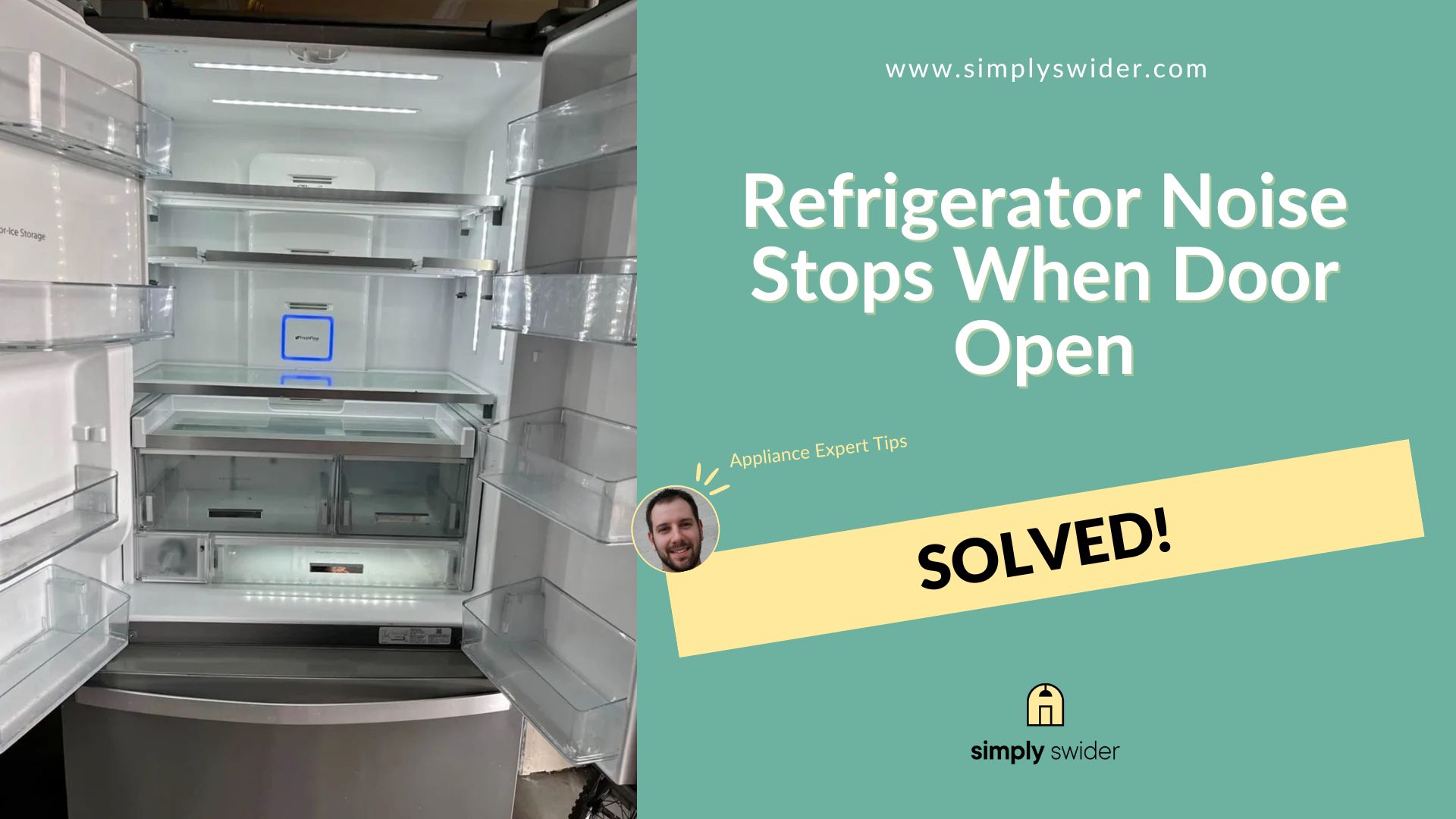Of course:
The second you realize the loud racket in your kitchen is coming from your refrigerator, you’re bound to get concerned. It’s pretty obvious something’s gone wrong.
Fortunately:
I know what’s making your refrigerator act up and clever ways to fix this. I’ve also got great input from Joshua Parker, a licensed appliance technician from Surrey.
Let’s get started!
Table of Contents
What Causes the Refrigerator Noise That Stops Once the Door Opens
There are multiple factors that can make the noise from your refrigerator suddenly switch from a gentle hum to a peculiar roar. When this occurs, it is usually caused by uneven refrigerator levels, blocked vents inside the fridge, faulty door seals, clogged evaporator fans, and faulty condenser fans.
Now:
It’s important to know that these issues are minor, and you can easily solve them by following the simple guides I have provided in this post.
Are you ready? Let’s begin!
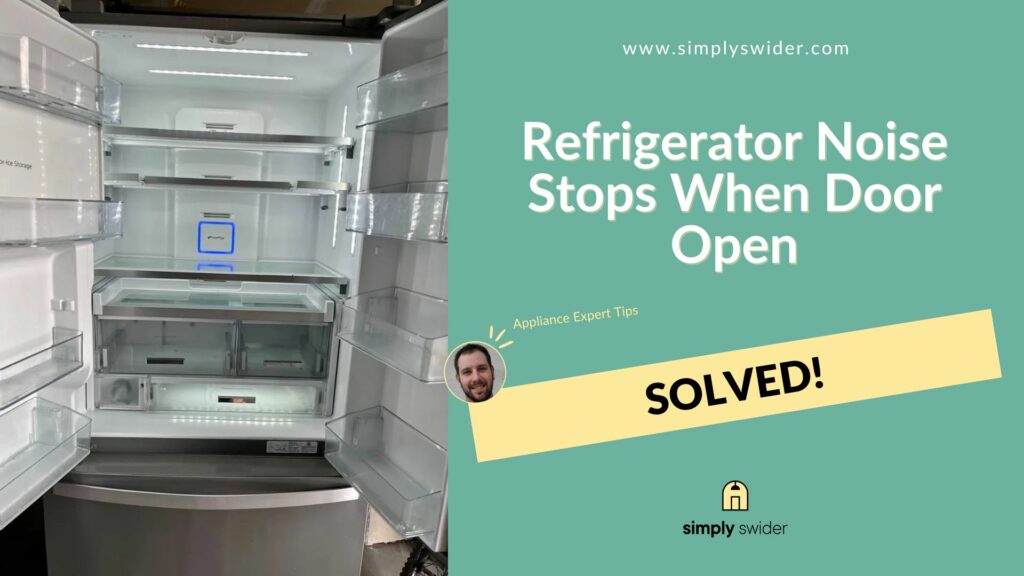
5 Common Causes and Troubleshooting Methods for Refrigerator Noise That Stops When the Door Opens
| Commonly Affected Parts | Estimated Cost |
|---|---|
| Door seal | $30 – $150 |
| Air vent | $100 – $120 |
| Evaporator fan | $25 – $50 |
| Condenser fan | $20 – $30 |
1. Uneven Refrigerator Level
Get this:
The first thing you should check once your refrigerator starts roaring angrily is the refrigerator level. This is done to ensure the fridge is well-aligned and one section of the fridge isn’t higher than the other.
Here’s why:
Your fridge requires two major fans to operate—the evaporator fan and the condenser fan.
Once one part of the fridge is slightly higher than the other, it causes the evaporator fan to spin off balance.
As the fan spins off balance, it begins to create strange, disturbing noises.
Now:
When a member of our Facebook Community recently complained about the noise his Whirlpool refrigerator was making, I suggested checking the fridge level to be sure it was aligned properly.
Sure enough:
He noticed the fridge was slightly off balance!
Thus, it is advisable to check if your fridge is level before attempting other advanced troubleshooting techniques.
To do this:
Joshua recommends checking the wheels at the bottom of the refrigerator to be sure all of them are resting on the floor. If they aren’t, you’ll need to adjust the level by following these steps:
- Step 1: Turn off the refrigerator and unplug from the power source.
- Step 2: Empty the refrigerator to make it lighter and easier to handle.
- Step 3: Identify the side of the fridge that is higher than the other and locate the leveling leg underneath that side.
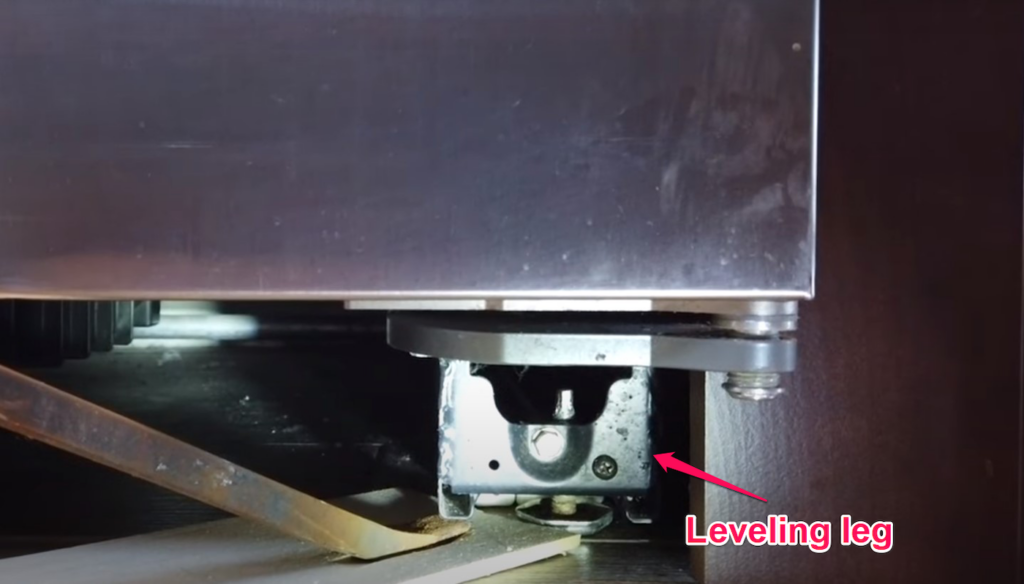
- Step 4: Using a crowbar to lift the fridge, you can adjust the leveling leg lever and lower the fridge by rotating it to the right or raise it by rotating to the left.
Finally:
After leveling the fridge, arrange its contents and turn it back on. The helicopter noise will finally stop once the fridge is properly leveled.
2. Blocked Fridge Vents
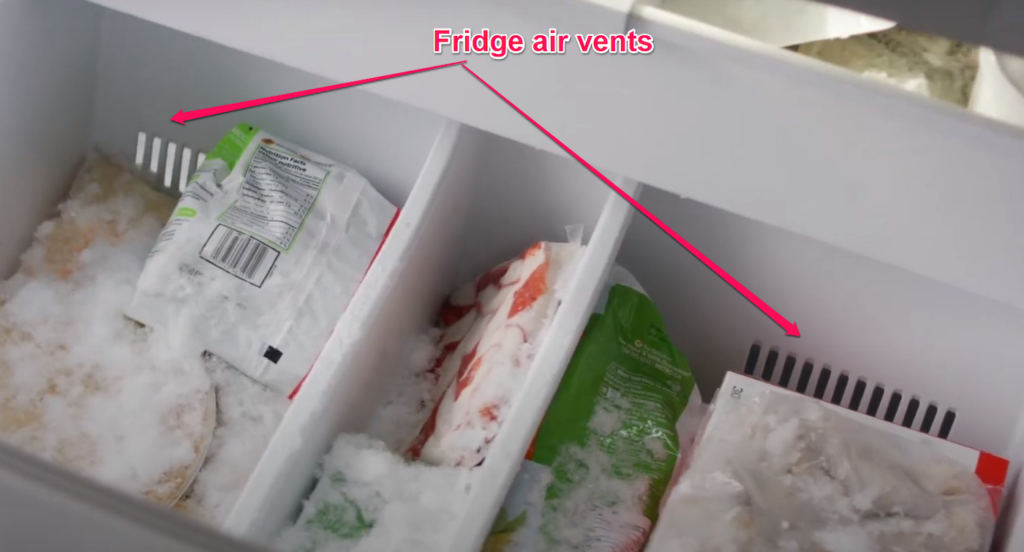
| Part | Air vent |
| Location | It is typically located inside the refrigerator, within the refrigerator compartments |
| Ease of troubleshooting | Easy |
| Cost | $100 – $120 |
| Repairable | Yes – if the vents are blocked with food containers or frost |
Now:
Once you’ve ascertained that your fridge level is just right and isn’t the cause of the noise you’re hearing, your next step should be checking the fridge vents.
Here’s why:
Every fridge tends to have vents responsible for circulating cool air and keeping all your food items closed.
If the airflow through these vents is restricted, it makes it difficult for your fridge to work properly and can cause it to make strange noises.
For instance:
This Reddit user noticed his LG refrigerator began to produce a strange humming sound after he’d stuffed a bottle in the bottom freezer. On hearing this, I suspected the air vents were blocked once he stuffed the bottom.
To support this, Joshua adds:
“Frequently, overstuffing is what causes that annoying helicopter noise. When you overstuff the fridge, you will place stuff in front of the vent, preventing air circulation.”
In my experience:
Overstuffing the fridge could result in items pressing against the back panel, making it difficult for the fan to work effectively.
Luckily:
This issue can easily be solved by reorganizing your refrigerator. First, you’ll need to take out all the food items in your fridge to locate the air vents.
After locating the vents, always ensure there’s at least 5cm between the food containers and the vent.
3. Damaged Door Seals
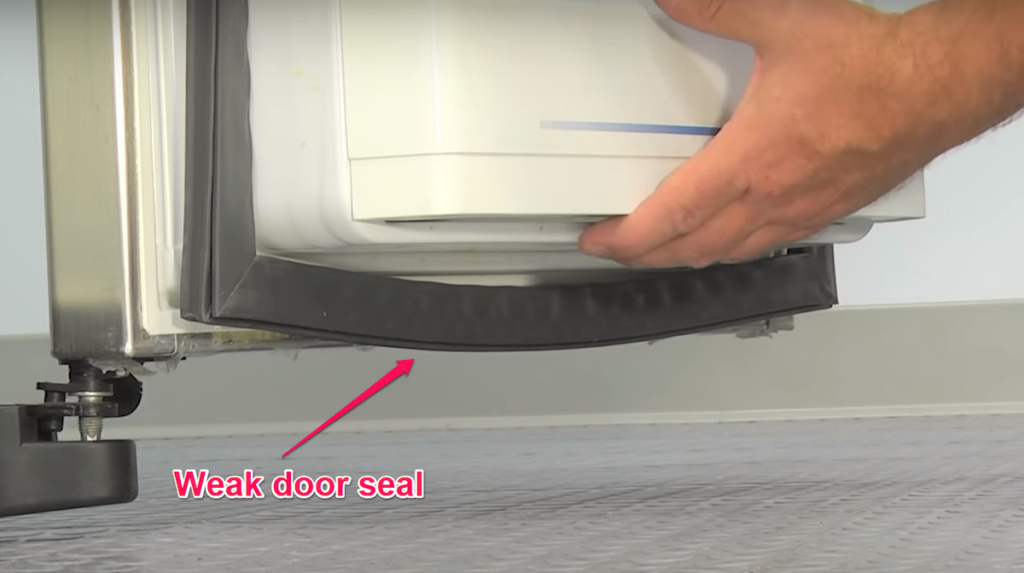
| Part | Door seal |
| Location | It can be found around the inner door of the refrigerator |
| Ease of troubleshooting | Easy |
| Cost | $30 – $150 |
| Repairable | Yes – but it is advisable to replace damaged door seals rather than repair them |
Unsurprisingly:
Part of the reason the noise stops once you open the door is that there’s something wrong with the door. Or, to be precise, there’s something wrong with the door seals.
You see:
The door seal is an element on the door of your refrigerator that ensures cold air in the fridge doesn’t escape.
In essence, it makes sure your fridge is closed tightly so it can work properly.
Now:
Once the seal is damaged, the cooling system in the refrigerator is forced to work harder to compensate for the temperature rise. This, in turn, causes it to make peculiar noises and is the reason some Frigidaire refrigerators have issues cooling.
Recently:
Beatrice, a member of our Facebook community, reached out when her Frigidaire started squealing loudly in the middle of the night. She also noted that the fridge seal had gradually gotten weak over time.
On hearing this:
Joshua recommended removing the broken seal and cleaning the door before inserting the new one. After replacing the seal, the noise stopped, and all was quiet again.
Thus:
If the refrigerator noise doesn’t stop even after trying the previous techniques, inspect the door seal to see if it’s damaged or broken.
Once the seal is broken, you can replace this component with a new one by following these steps:
- Step 1: Turn off your refrigerator and unplug it from the power source.
- Step 2: Open the refrigerator and gently remove the weak door seal.
- Step 3: Clean the cavity the ejected seal came from to get rid of dirt and debris.
- Step 4: Insert the new door seal and press until it is seated properly
- Step 5: Close the refrigerator and turn it back on.
After doing this, cold air will no longer escape from your fridge, and the noise will finally stop.
4. Clogged Evaporator Fan
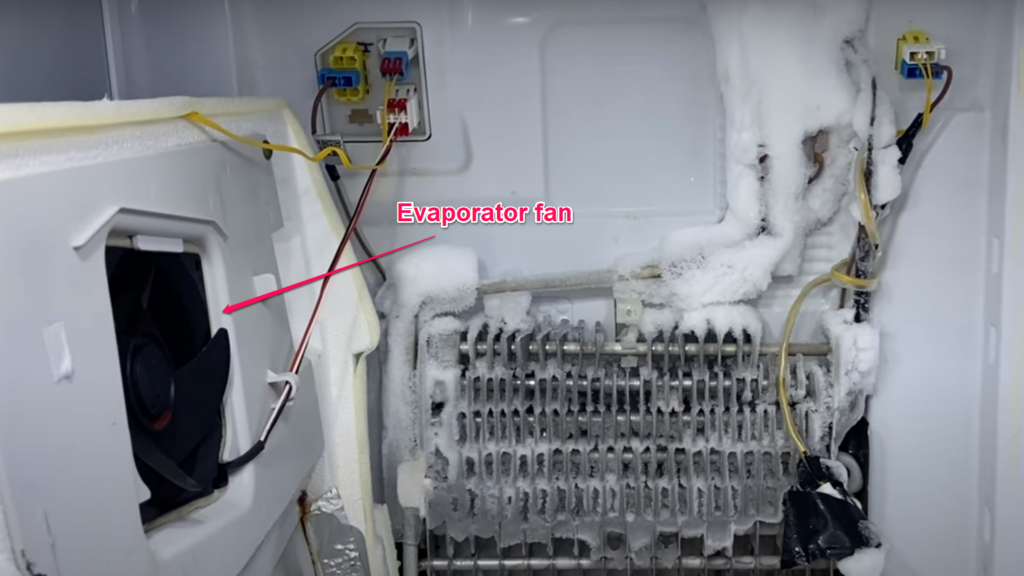
| Part | Evaporator fan |
| Location | It is located inside the refrigerator, behind the back panel |
| Ease of troubleshooting | Easy |
| Cost | $25 – $50 |
| Repairable | No – you can only defrost the ice buildup or replace the fan once broken |
Amazingly:
The primary reason the noise stops once you open the fridge is because of the evaporator fan. Typically, a refrigerator is designed with multiple sensors and control mechanisms to save energy.
As such:
The second you open your fridge, it immediately senses the temperature rise. To save energy, your fridge automatically shuts down the evaporator fan motor, thus stopping the noise.
Here’s why:
The noise your fridge makes is because there’s an obstacle impeding the motion of the evaporator fan. Usually, the obstacle is a result of ice accumulation near the fan.
You see:
As the evaporator fan rotates, it collides with the ice buildup, making your refrigerator produce loud knocks. The longer this happens, the higher the chance of damaging the evaporator fan.
Thus:
It is advisable to take action before things escalate, resulting in an even bigger problem. The last thing you’d want is to end up with a broken evaporator fan.
For instance:
This Reddit user discovered his LG refrigerator kept making a loud noise even though the fridge was working well and temperatures weren’t fluctuating.
After reading his complaint, I believed the problem was due to ice accumulation near the fan, and Joshua agreed.
In his words:
“Most of the time, the uproar is caused by ice buildup near the evaporator fan blades. You’ll keep hearing the noise as the blades keep hitting the ice. After a while, the fan gets weaker and could eventually crack.”
Thankfully:
You can solve this problem by getting rid of the ice. There are multiple ways you can do this—it all depends on what technique you believe works best for you.
Now:
You can melt the ice naturally by turning off your refrigerator for 24 hours. Be sure to leave some towels beneath the fridge to soak up water.
However:
If you can’t afford to turn off your fridge for that long, you can get rid of the ice by following these steps:
- Step 1: Unplug your refrigerator from the power source.
- Step 2: Empty the refrigerator and take out all the compartments inside the fridge.
- Step 3: Take out the screws holding the back panel of the fridge.
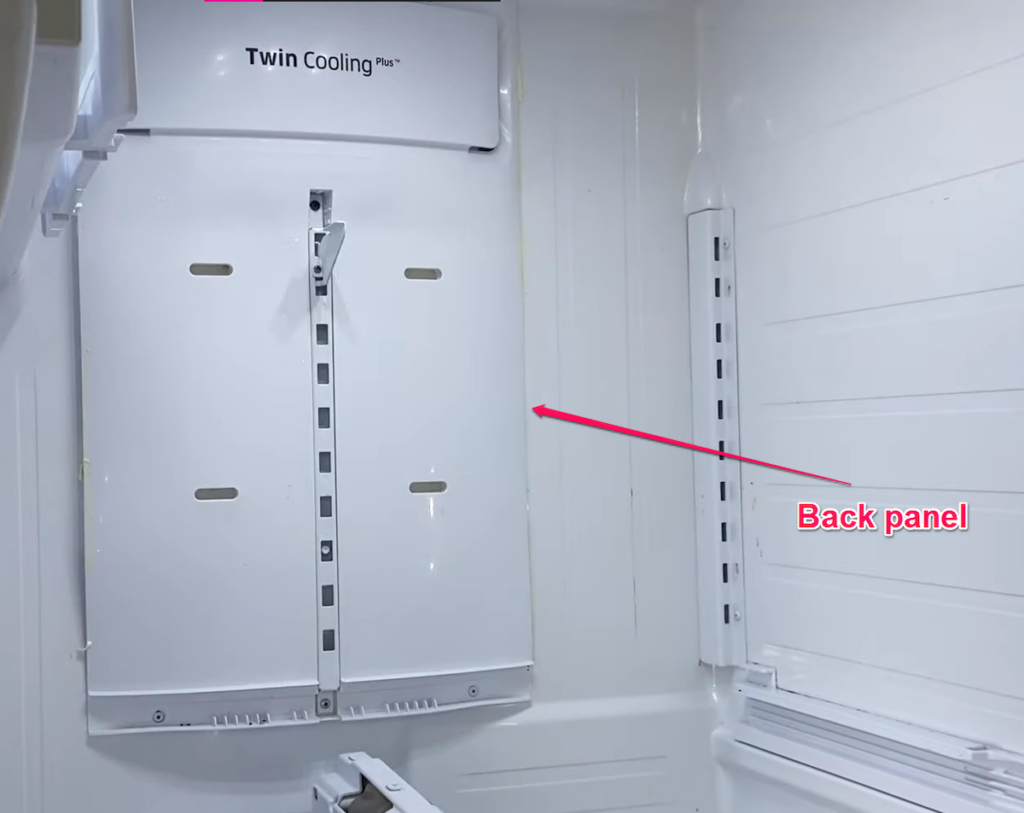
- Step 4: Gently pull the panel out. While doing this, be extra careful to avoid damaging the connection to the back panel.
- Step 5: Melt the ice frost by using a blow dryer or steamer set at low heat.
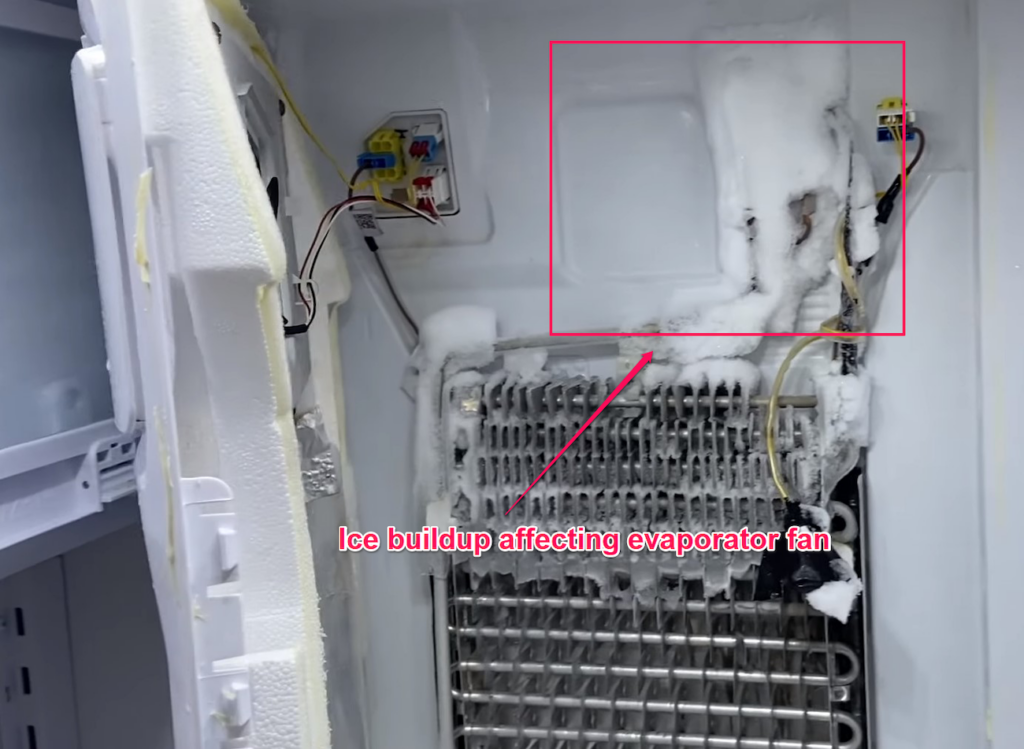
- Step 6: Empty the drain and use a clean towel to dry the fridge.
Finally:
After reassembling the fridge, place all the containers back in the fridge and turn it back on. Now that you’ve gotten rid of the ice frost, your fridge should be as good as new.
5. Faulty Condenser Fan
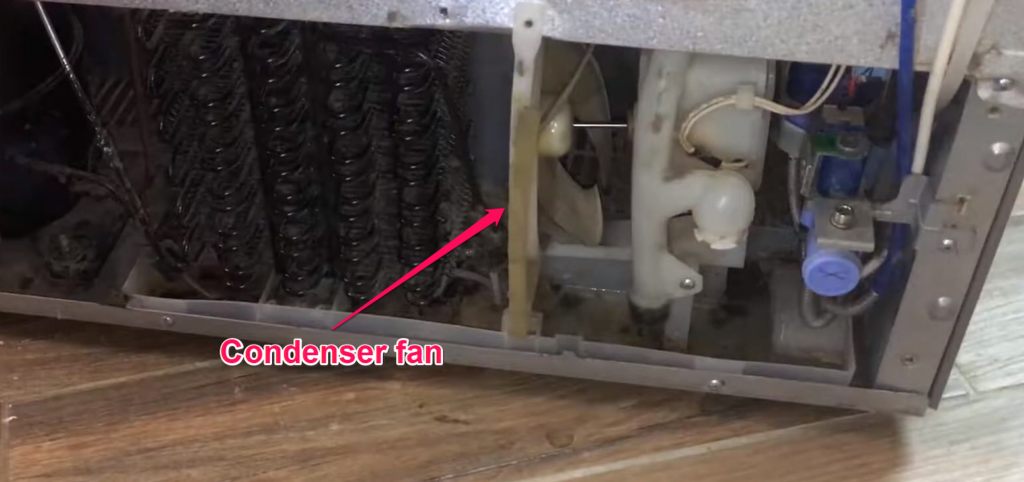
| Part | Condenser fan |
| Location | It is located at the back of the refrigerator |
| Ease of troubleshooting | Easy |
| Cost | $20 – $30 |
| Repairable | No – you can’t repair condenser fan. You can only remove dust around it and replace once broken |
If you notice the noise your refrigerator is making originates from the back of the fridge, it most likely means the issue is caused by the condenser fan.
As I mentioned, your refrigerator has two fans—evaporator and condenser fans. As long as there’s an issue with the condenser fan, your refrigerator will make weird clicking noises.
You see:
Two significant factors can impede the efficiency of the condenser fan belt. The first is when dirt or debris clogs the fan, preventing it from moving properly.
The second occurs when the condenser fan fails by breaking or cracking.
For instance:
A Reddit user complained when he noticed his Whirlpool 21.4-cu ft side-by-side refrigerator began to make loud noises and only stopped when it was closed or pushed.
After watching the video he shared, I believe a faulty condenser fan caused this problem, and Joshua agreed.
Now:
You can fix this problem by inspecting the condenser fan and replacing it if necessary. This can be done by following these steps:
- Step 1: Turn off the refrigerator and unplug it from the source.
- Step 2: Pull out the refrigerator and locate the condenser fan unit at the back.
- Step 3: Take out the panel covering the unit to reveal the condenser fan.
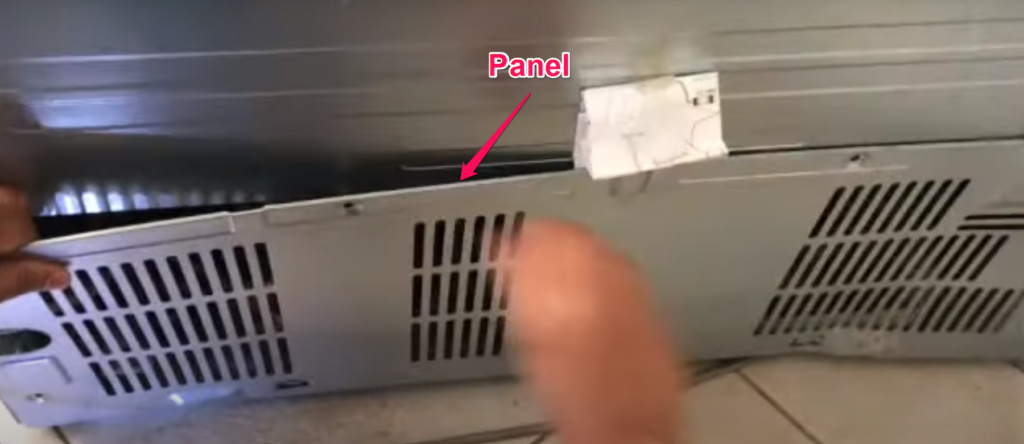
- Step 4: Gently use your fingers to rotate the condenser fan.
- Step 5: If the condenser blade is clogged but not broken, remove the obstacle in its path.
- Step 6: If the blade is damaged, take out the fan from the refrigerator.
- Step 7: Replace it with a new condenser fan.
- Step 8: Remove dirt and debris in the unit.
Finally:
After reassembling your refrigerator, plug it back in, and say goodbye to the buzzing noise.
Conclusion
As I’ve explained:
Several factors could cause your fridge to act up and make loud, aggressive noises.
This could cut across uneven refrigerator levels, blocked fridge vents, damaged door seals, ice buildup near the evaporator fan, and a faulty condenser fan.
Typically, you can troubleshoot this problem by:
- Leveling your fridge.
- Removing obstacles near the fridge vent.
- Replacing damaged door seals.
- Thawing ice buildup near the evaporator fan.
- Replacing broken condenser fan.
Of course:
If you’d like to learn more, you can easily speak to our professionals using our “Ask an Expert” feature. We’re more than happy to help!
Now:
Do you know other clever ways to fix the refrigerator noise that stops when you open the door? Let us know in the comment section below!
Frequently Asked Questions
Once you open your refrigerator, it automatically goes into power-saving mode, shutting down the evaporator fan, compressor, and condenser fan. This stops the fridge from making noise and also conserves energy.
No. Your refrigerator is expected to make gentle hums while operating to show its components are intact. If your fridge is silent, a component must be replaced or fixed.
You can silence your noisy refrigerator by leveling the fridge, clearing the fridge vent, or replacing the door seal. Additionally, you can fix this by removing ice frost near the evaporator fan and replacing the faulty condenser fan.

